 A child high fives a pharmacist after he received the Pfizer-BioNTech COVID-19 Vaccine for kids at Hartford Hospital in Hartford, Connecticut on Nov 2, 2021. (JOSEPH PREZIOSO / AFP)
A child high fives a pharmacist after he received the Pfizer-BioNTech COVID-19 Vaccine for kids at Hartford Hospital in Hartford, Connecticut on Nov 2, 2021. (JOSEPH PREZIOSO / AFP)
NAIROBI / WASHINGTON / DUBLIN / ROME / RIGA / BERLIN / ZURICH / PARIS - Two doses of Pfizer-BioNTech COVID-19 vaccine greatly reduced the risk of Omicron infection among children aged 5 to 15, according to a study published by the US Centers for Disease Control and Prevention on Friday.
Children and adolescents aged 5 to 15 were tested for SARS-CoV-2 weekly, irrespective of symptoms, during July 2021 to February 2022, according to the CDC.
Approximately one half of Omicron infections in unvaccinated children and adolescents were asymptomatic, according to the CDC.
Two doses of Pfizer-BioNTech COVID-19 vaccine reduced the risk of Omicron infection by 31 percent among children aged 5 to 11, and by 59 percent among adolescents aged 12 to 15, according to the CDC study.
The Pfizer-BioNTech mRNA COVID-19 vaccine was recommended by CDC's Advisory Committee on Immunization Practices for adolescents aged 12 to 15 on May 12 last year, and for children aged 5 to 11 years on Nov 2.
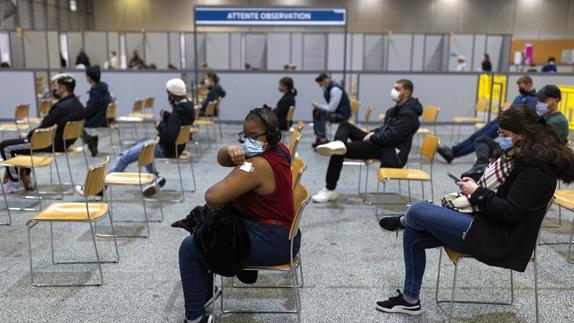 People wait during an observation period after having received Moderna's COVID-19 vaccine, in a vaccination center, in Nantes, western France on Dec 30, 2021. (JEREMIAS GONZELES / AP)
People wait during an observation period after having received Moderna's COVID-19 vaccine, in a vaccination center, in Nantes, western France on Dec 30, 2021. (JEREMIAS GONZELES / AP)
France
New COVID-19 infections in France rose by more than 25 percent on Friday compared to a week ago after rising more than 24 percent on Thursday, as a downward trend that had started late January reversed.
The health ministry registered 72,399 new infections on Friday, while the seven-day moving average of new infections also rose, for the fourth day in a row, by nearly 16 percent to more than 60,000.
New hospitalizations with COVID-19 - which tend to lag new cases by about two weeks - continued falling by 7 percent to just over 21,000.
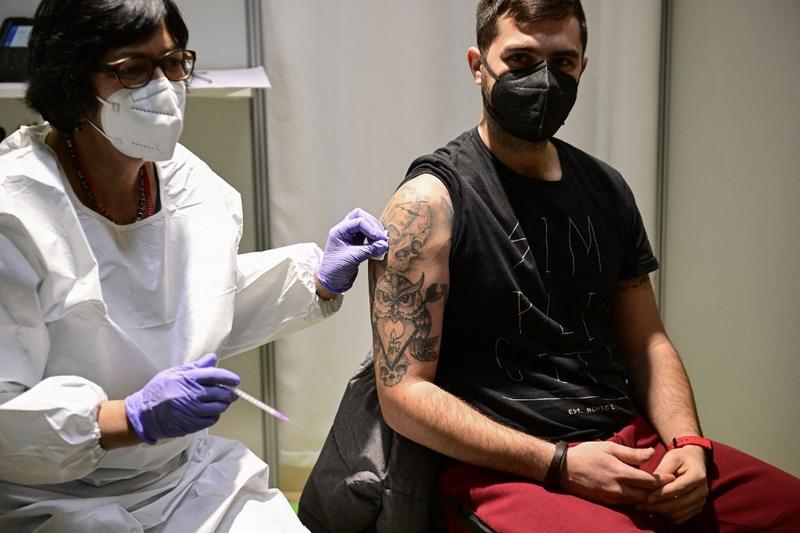 A young man receives the Nuvaxovid vaccine against COVID-19 at the CIZ Tegel vaccination center in Berlin on Feb 28, 2022. (TOBIAS SCHWARZ / AFP)
A young man receives the Nuvaxovid vaccine against COVID-19 at the CIZ Tegel vaccination center in Berlin on Feb 28, 2022. (TOBIAS SCHWARZ / AFP)
Germany
The daily number of new COVID-19 cases in Germany increased to 252,836 on Friday, exceeding last Friday's figure by 35,000, the Robert Koch Institute for infectious diseases said on Friday.
The country's seven-day COVID-19 incidence rate also increased to 1,439 per 100,000 inhabitants on Friday. On Thursday, the country reported a new all-time high of 262,752 cases.
Health Minister Karl Lauterbach said the situation in the country was critical. "We cannot be satisfied when 200 to 250 people die each day," he told journalists on Friday.
"Without mandatory vaccination, we will not get the pandemic under control in the autumn," Lauterbach warned. "We will be facing exactly the same situation in the autumn as we are now, if not worse."
As of Thursday, at least 48 million people, or 57.7 percent of the population, had received a booster dose in Germany, while 19.6 million people are not vaccinated, according to official figures.
Due to less severe cases associated with the Omicron variant of coronavirus, Germany's federal and state governments have agreed to successively relax most COVID-19 measures by March 20.
However, basic protection measures, such as a face mask mandate in certain areas, will remain in force.
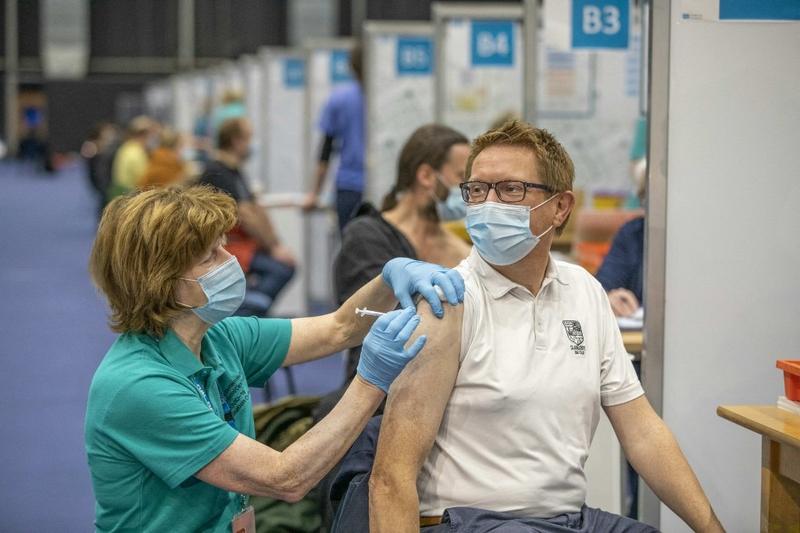 In this file photo taken on Dec 21, 2021, members of the public receive a dose of a COVID-19 vaccine at a temporary vaccination center set up in the Titanic Exhibition Centre in Belfast. (PAUL FAITH / AFP)
In this file photo taken on Dec 21, 2021, members of the public receive a dose of a COVID-19 vaccine at a temporary vaccination center set up in the Titanic Exhibition Centre in Belfast. (PAUL FAITH / AFP)
Ireland
The daily number of confirmed COVID-19 cases in Ireland has more than tripled in less than two weeks after the country lifted the mask mandate, according to the figures released by the Irish Department of Health on Friday.
Ireland reported 9,186 PCR-confirmed cases on Friday, an increase of more than 300 percent from the 2,277 cases recorded on Feb 28, the day when the country scrapped most of its remaining COVID-19 restrictions, including the mandate for mask wearing in public indoor settings and on public transport.
According to the department, 907 COVID-19 patients are currently being treated in hospitals across the country, up nearly 49 percent compared with the figure recorded at the end of last month.
Despite the surge in the daily numbers of COVID-19 cases and hospitalizations, the number of COVID-19 patients being treated in intensive cares units in Ireland declined for the third day in a row - down to 37 from 51 on Tuesday.
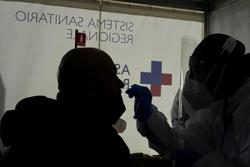 A medical staffer takes a nasal swab for a COVID-19 rapid test at a testing site in Rome on Dec 30, 2021. (ANDREW MEDICHINI / AP)
A medical staffer takes a nasal swab for a COVID-19 rapid test at a testing site in Rome on Dec 30, 2021. (ANDREW MEDICHINI / AP)
Italy
Reversing a trend of several weeks of improvement, Italy's COVID-19 situation is getting worse again, the country's Health Ministry said on Friday.
This week, the transmission rate in Italy increased to 0.83 from 0.75 a week earlier. This rate, also referred to as R0, shows how many cases on average an infected person will cause during their infectious period. Although the R0 rate is still below 1.0 in Italy, health officials say the recent increase is significant.
The increase has prompted media speculation that the country could be heading toward a new, albeit milder wave of infections now that most health restrictions have been relaxed.
On Friday, the ministry reported 53,127 new coronavirus cases. This figure is broadly in line with the previous days' reports but is higher than the recent low of just over 18,000 cases logged on Feb. 28. Back in January, the authorities reported over 200,000 new cases per day.
Also on Friday, the ministry reported 156 coronavirus-related deaths, 20 more than on Thursday and to the same number as on Wednesday. These figures are significantly lower than those recorded in January and are way below the all-time highs of nearly 1,000 daily deaths in late 2020.
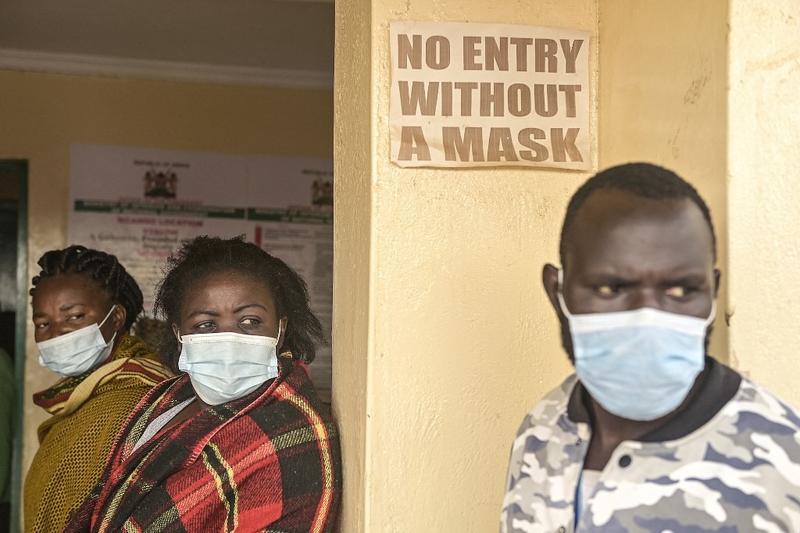 People wait to be vaccinated against COVID-19 at Ngando informal settlement in Nairobi on Dec 16, 2021.
(SIMON MAINA / AFP)
People wait to be vaccinated against COVID-19 at Ngando informal settlement in Nairobi on Dec 16, 2021.
(SIMON MAINA / AFP)
Kenya
Kenya's Ministry of Health on Friday announced suspension of public health measures aimed at containing the spread of coronavirus, as infections and fatalities subside countrywide.
Mutahi Kagwe, cabinet secretary in the Ministry of Health, said the lifting of the mask wearing mandate and a ban on public gatherings was informed by a sustained drop in new infections, hospitalizations and deaths arising from the virus.
He encouraged the public to wear masks while attending indoor activities in poorly ventilated spaces, adding that in-house worship for fully vaccinated individuals will resume.
In addition, Kagwe said that fans will be allowed to attend sporting activities without wearing masks while international visitors with proof of vaccination will not be required to undergo rapid tests.
He said public service vehicles will henceforth resume full carrying capacity without demanding passengers to wear masks, as the country's positivity rate dropped to less than one percent in the recent past, said Kagwe.
Kagwe clarified that unvaccinated travelers would be subjected to antigen test at their own cost besides self-isolating to avert risk of transmitting the virus to the general population.
Latvia
Latvia has reported the highest number of COVID-19-related deaths in the previous two weeks in the European Union and the European Economic Area, according to the European Center for Disease Prevention and Control.
In the period between Feb. 21 and March 6, the country logged 127.4 deaths from laboratory-confirmed COVID-19 cases per one million residents. Although Latvia's COVID-19 death rate has been declining in recent weeks, elsewhere in Europe the drop has been steeper.
Across the EU/EEA member states, the average number of deaths from laboratory-confirmed COVID-19 was 41 per one million residents in the same two-week period.
 People queue at a COVID-19 test center installed in a street of Swiss capital Bern on Sept 17, 2021. (FABRICE COFFRINI / AFP)
People queue at a COVID-19 test center installed in a street of Swiss capital Bern on Sept 17, 2021. (FABRICE COFFRINI / AFP)
Switzerland
Switzerland has secured at least 14 million doses of COVID-19 vaccines for 2023, the government said on Friday.
"For 2023, in addition to the seven million doses of Pfizer/BioNTech vaccine already purchased, the Federal Council has decided to also procure seven million doses from Moderna. At the same time, Switzerland has options – to be exercised only if needed – to procure a further seven million vaccine doses from each provider," it said in a statement.
"In addition to this, a maximum of one million doses will be acquired from another vaccine manufacturer as an alternative to the mRNA vaccines."


